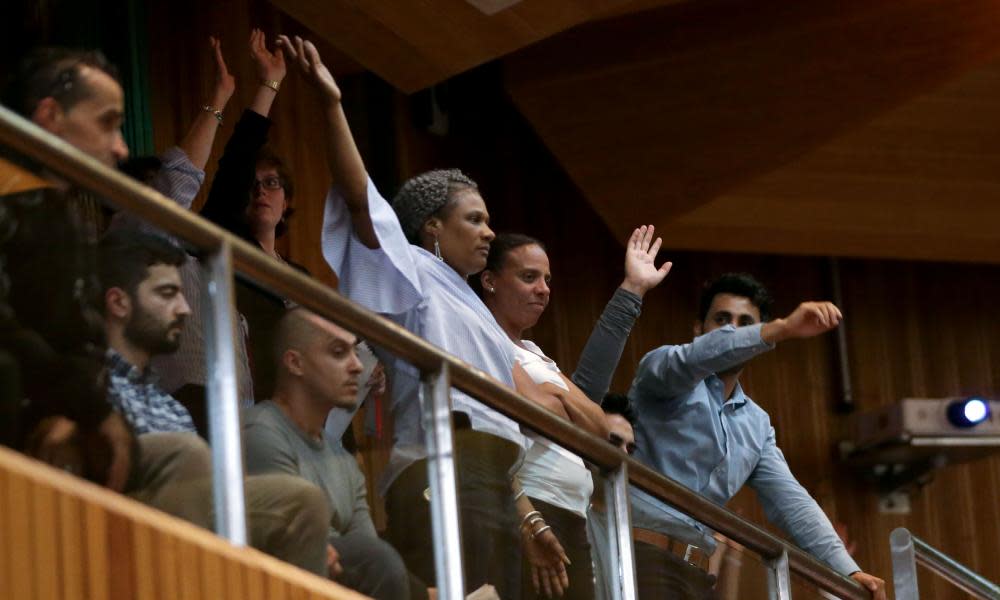Councillors fear abuse – Grenfell residents are used to it

On Wednesday evening, I attended the first open council meeting of Royal Borough of Kensington and Chelsea council (RBKC) since the Grenfell Tower fire. The last meeting barred the public and, initially, the press until a court order demanded we be let in – then the meeting was adjourned due to our presence. On Wednesday, locals queued outside but were told there was limited space so most would be able to watch only by videolink. The journalists were patted down by security guards and had our bags searched before being allowed into the chamber.
A number of survivors were granted seats in the chamber. Part of the agenda was given over to hearing their testimony and that of their family members. The testimonies were harrowing, full of both insurmountable, open grief and uncontrollable anger at both the repeated refusal to listen to residents’ concerns before the blaze, and their shambolic and callous treatment since.
The aunt of missing Jessica Urbano told the council she had emailed the council’s new leader Elizabeth Campbell about the treatment of her 13-year-old niece’s family, but had received no reply. Another escapee said: “I wish I had lain down and died in the inferno, because the children that went to bed and turned to ash in that tower did not deserve to die. We need closure. We know you can’t bring back the dead, but you can treat them better than dogs. Britain is a banana republic now.”
Throughout the meeting, those allowed inside complained vociferously about the fact that many survivors were locked out, or in a balcony above the main chamber, prevented from speaking. Residents outside hammered on the locked doors as security held them back, and those inside demanded they be let in, further panicked by the fact that security staff appeared to have locked the fire doors in a particularly cruel irony. Every response from Conservative councillors was met with boos, heckles and calls to resign and stand down. It was clear that no residents present had any faith in the leadership’s ability to address concerns about housing across the borough, and the Labour and Liberal Democrat councillors present repeatedly called for commissioners to be brought in and the leadership to stand down.
The complete lack of confidence in the council is not sudden. One woman, translating for an Iranian survivor who fainted at the close of the meeting, spoke of her experiences volunteering with residents but also of how she had grown up in Holland Park, one of the richer parts of the borough. “As a child,” she said, “We did not have this rich–poor divide in this area. This is what you have done to the borough, you have destroyed it.”
RBKC provides an extreme example of what happens when inequality is entrenched by council decisions. The abandonment of people living in social housing left residents across the borough feeling ignored, abandoned and disenfranchised. Everyone needs a place to live, and stability, and when councils are seen to actively work against tenants they lose trust and this sows dissent. Many councils across the country, Conservative and Labour, have treated tenants appallingly: the recent factual film Dispossession is scathingly precise in its documentation of how widespread this phenomenon and treatment has become.
Why do they do so? They feel they have power and that those on low incomes, those with disabilities, and migrants are unlikely to fight back or if they do they can be dismissed because they are undesirables. But residents are fighting back, because they have far more to lose – and councils must prioritise secure housing and the standard of social housing stock or risk destroying their own standing in communities. Councillors will lose their seats, but tenants are in fear of their futures.
As Eve Wedderburn, a local resident told RBKC council: “You keep us away in a separate gallery. You fear being shouted at. We fear being abandoned and left to die. Councillors, stand down.”
Sign up for your free Guardian Housing network newsletter with comment and sector views sent direct to you on the last Friday of the month. Follow us:@GuardianHousing
Looking for a housing job, or need to recruit housing staff? Take a look at Guardian Jobs.

 Yahoo News
Yahoo News 
